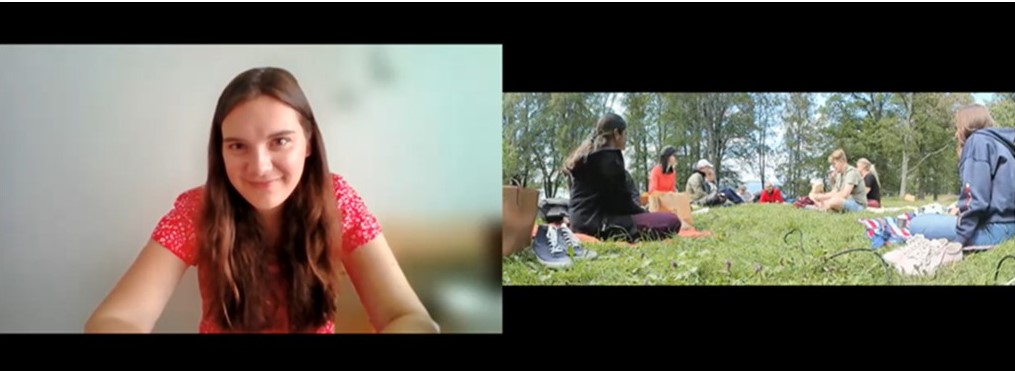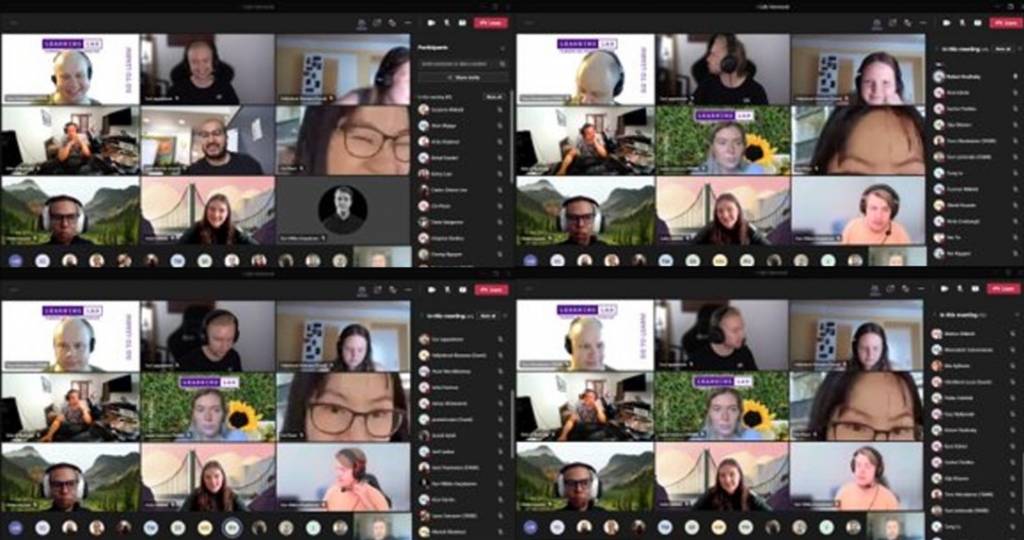Introduction
This study explores students’ energy levels during team learning in remote learning settings at a Learning Lab in the summer of 2021. This is a qualitative study that investigates physical, emotional, mental, and spiritual energy levels through the lens of team learning and remote work settings with the help of eight different interviews.
Learning Lab is an interdisciplinary development and learning environment. All projects are done for real need in collaboration with clients. In the summer of 2021, all work was done remotely, which challenged the motivation, effectiveness, and well-being of some participants.
Energy Levels in General
This study concentrates on managing energy levels of Learning Lab students and teams in their different team learning projects for six weeks. According to Loehr and Schwartz (2001, 2005) four different energy sources can be found in human beings, which are the body, emotions, mind, and the spirit. Often people take their energy for granted and do not pay much attention to it. However, each of these energy sources can be expanded and renewed. In other words, energy levels can be increased. We can significantly influence our capacity to get things done. One of the best ways to get more things done faster, better and in a more enjoyable way, is to increase the capacity of each four sources. (Schwartz & McCarthy, 2007; Spence, 2016)
According to Loehr and Schwartz (2001, 2005) cognitive capacity, emotional intelligence, a spiritual dimension, and physical capacity have been linked to high performance. These four elements need to be balanced. What is more, they affect one another. People need to be considered as entities if they want to continue to perform at a high level. Simply put, the best long-term performers can tap into positive energy on all four levels of their energy. Everybody can train to better manage their inner state and use the full range of their capacities to flourish.
Considering all these four elements not only improves performance, but also enhances health and increases quality of life. Loehr and Schwartz (2005) argue that managing these energy levels is the key to high performance and personal renewal instead of managing time. According to Cameron (2012), positive energy benefits not only the individual, in that they perform better, but also others in that organization.
Physical Capacity
When it comes to taking care of physical energy levels of students during the Learning Lab, some respondents highlighted the importance of very well-structured and planned approaches. This included e.g., morning walk routines each morning between 9–9.30 and triweekly one-hour exercise sessions.
Additionally, learning remotely is more flexible and gives the chance to plan the day with the team in accordance with one’s team schedule. This gave the students a chance to take a power nap during the day:
“I’m taking a nap in the middle of the day…to me a nap in the middle of the day, for example, like half an hour and I generate my energy and I’m like rational in my thinking for the half of the day. Yes, the next half of the day, so…”
In remote learning, it is important to include virtual social events and activities. A picnic lunch (Picture 1) in a local park was organized by the Learning Lab staff the importance of which was highlighted by students. It was an energy booster for many. Students consider it is vital to have social events that are not related directly to the projects. This also provides energy for the projects. For this reason, a virtual café that took place every day at Learning Lab at 14.30 was implemented in the second half of the course.
“We enjoyed here is this uh well this morning routines getting up just saying hi to guys on Discord. Just and everyone. Basically, just saying morning and kind of like checking, yeah…”

Picture 1 Enjoying lunch together in person and remotely. Photo by Learning Lab.
Emotional Capacity
In general, the Learning Lab and team learning generated positive emotions such as joy, excitement, contentment, enjoyment of success as well as happiness from team learning, and pride in getting things done. There were also negative emotions involved, such as anxiety, fear of failure, distress, disappointment, frustration, and being overwhelmed. Surprisingly, the importance of very well-structured and planned approaches also played a vital role in terms of emotional energy. Weekly goals and reflections helped not only to reduce stress but also to gain successful experiences by accomplished sub-goals. Thus, anxiety was shifted to enjoyment of small-scale victories, which in turn boosted self-confidence.

Picture 2 Communication and understanding each other’s emotions are easier in remote work when people have their cameras on. Photo by Learning Lab.
In team learning it is important to understand different perspectives as well as other students’ emotions to make the team learning process a success (Picture 2). The most common way to deal with negative emotions is to talk them through with team members. However, not all teams were able to build enough trust to have the courage to express all their emotions freely.
“Yes, for example positive. I think within the group we quite had a positive vibe and we have been everyone has been very easygoing and easy to talk to, and when you want to… We all talked to each other. The communication was really good. You coaches have been really nice really good always available pretty much or whatever always there if we needed some help or confused something. That has been always positive…”
“Oh, I didn’t talk about my emotion. Yes, I didn’t address my emotion…Is a little bit pity, but because maybe in the team building, I didn’t trust my members…We just get to know each other for three weeks so far that moment when it happened and we just being together for six weeks in total together. It’s shocking, and so I didn’t have trust…”
Team learning may lead to positive emotions when noticing one’s capabilities and development. You just need to be brave, proactive and make things happen even though you are not sure about the end outcome.
Mental Capacity
It depends on the person whether it is easier or harder to focus on things at remote learning. Some students consider the importance of interesting and engaging topics to be the real issue in concentration, instead of whether learning is remote or not. Team learning also helped students to focus better on the task at hand because they were creating something new together and needed to be present all the time.
“But yeah, it has really helped me to keep my concentration on the point when we have all been working together and discussing about the situation and sharing our thoughts and like keeping Uh, the public alive and fresh in their mind. By having this conversation and pondering and thinking as a as a team So for me it has really been a helping factor. If I’d done something like this by myself, it would have been really way too easy to get distracted on the vast world of…”
The importance of having the camera on while learning remotely together with others was considered vital in terms of focusing as well.
“Of course, it can be very unmotivating for some people to do this online and more easy to lose focus ’cause you’re just at home. And if your camera is off, you just do whatever you want and no one knows about it. But it definitely depends on the person, I think…”
Team learning supports and increases mental capacity. Hope is enhanced among team players, too. Solutions will be found together, and individual pressure is smaller when the whole team takes the burden.
Spiritual Capacity
In this context, spiritual does not refer to being religious. It is the connection to a deeply held set of values and to a purpose beyond self-interest. The spiritual capacity is a powerful source of motivation, focus, determination, and resilience. (Loehr & Schwartz, 2001.)
Learning team learning skills as well as learning project work are considered to be motivational factors and driving forces of purpose in a Learning Lab among students. To learn a proactive way of working and taking responsibility for contacting clients is something important for students to learn. Students feel these kinds of learning are needed in future working life. In addition, emotional intelligence is highlighted and the importance of empathy and understanding others are also regarded as important aspects of learning. For some students the goal of the summer is to get some rhythm and structure for the summer and to increase their own belief in themselves.
“Generally, team learning is something that we have to be good, I’m not sure how to say but know how to act or be when we are in a team…”
“The thing I mentioned earlier is to get some rhythm on my days… Uh, so that’s a success I feel that. I’ve done something hopefully useful, and I’ve spent my time. Uh, like productively so that has been a big success for me….It has been nice to see that at the beginning, when I was looking at the topics of the learning labs. I was thinking to myself that there’s no way I can be of any help or of any assistance to anyone at any of these things, but it has been really fun to prove myself wrong with that…”
Conclusion
It is important to consider all four energy sources: physical, emotional, mental, and spiritual. This was confirmed by Learning Lab students in the summer of 2021 while studying and working remotely.
Team learning may lead to positive emotions when noticing one’s capabilities and development.
The Learning Lab is very well organized and structured on a weekly as well as on a daily level. This gives a rhythm and routine for the students to plan their physical energy needs.
Remote learning can be tough and challenging due to lack of face-to-face activities. According to the students, it is important to pay attention to unofficial social events, because they can boost emotional energy levels and as well as team spirit.
One team had success using Discord. They agreed that team spirit was boosted by using this channel to run unofficial meetings. It promoted their positive emotions towards each other and team spirit.
The interviews showed that team learning can create positive pressure which in turn sharpens the focus on the task at hand. Many agreed that it is easier to focus while learning in a team instead of alone. However, it is ultimately a personal preference and not everybody felt this way. The importance of webcams in maintaining a visual connection while learning remotely was highlighted.
In terms of spiritual capacity, students can set goals for themselves that are related to their authentic life. Understanding the connection between learning goals and the real value that it can have for their future is something valuable for them. In this way they generate meaning and purpose for their learning.
References
Cameron, K. 2012. Positive Leadership. Strategies for Extraordinary Performance. 2ndEdition, Updated and Expanded. Oakland: Berret-Koehler Publishers, Inc.
Loehr, J. & Schwartz, T. 2001. The making of a Corporate Athlete. Harvard Business Review. 1/2001. Read on 1.10.2021. https://hbr.org/2001/01/the-making-of-a-corporate-athlete
Loehr, J. & Schwartz, T. 2005. The Power of Full Engagement. Managing energy, Not Time, Is the Key to High Performance and Personal Renewal. New York: The Free Press, A Division of Simon & Schuster, Inc.
Schwartz, T. & McCarthy, C. 2007. Managing Yourself. Manage Your Energy, Not Your Time. Harvard Business Review. 10/2007. Read on 1.10.2021. https://hbr.org/2007/10/manage-your-energy-not-your-time
Spence, G. 2016. Coaching for Optimal Functioning. In Van Nieuwerburgh, C. (ed). Coaching in Professional Context. London: SAGE Publications Ltd, 11–28.
Authors
Eija Syrjämäki
B.Env.Eng., MSSc
Senior Adviser, Learning Lab Project Coach and Coordinator
Tampere University of Applied Sciences
eija.syrjamaki@tuni.fi
Fields of expertise: Team Learning, Coaching, Sustainability, Development
Toni Lehtimäki
Ph.D. student, MAPPCP and M.Sc. Economics
Coach of Proakatemia
Tampere University of Applied Sciences
toni.k.lehtimaki@tuni.fi
Fields of Expertise: Positive Psychology and Coaching Psychology
Photo: Jonne Renvall / University of Tampere

